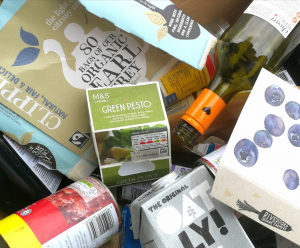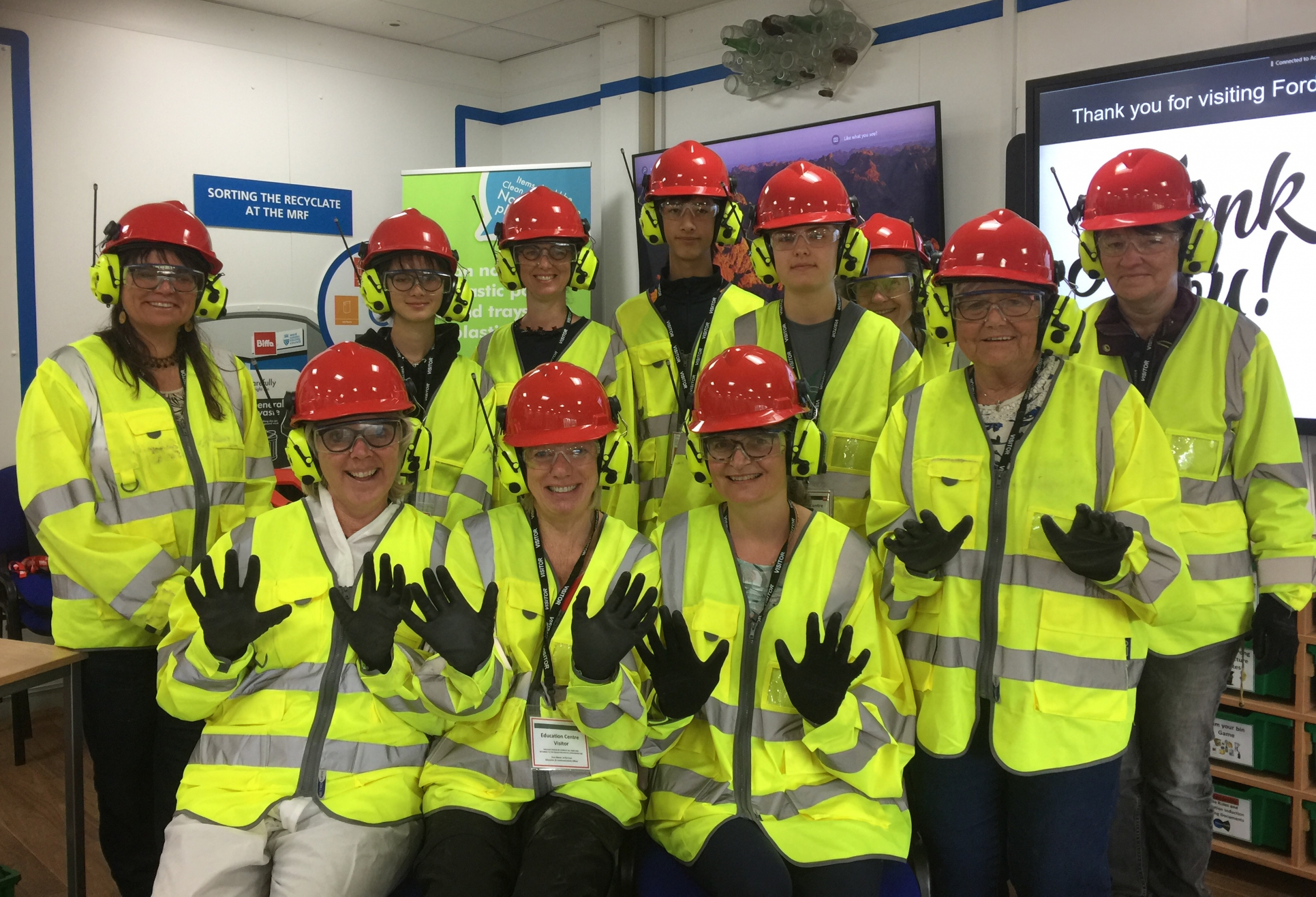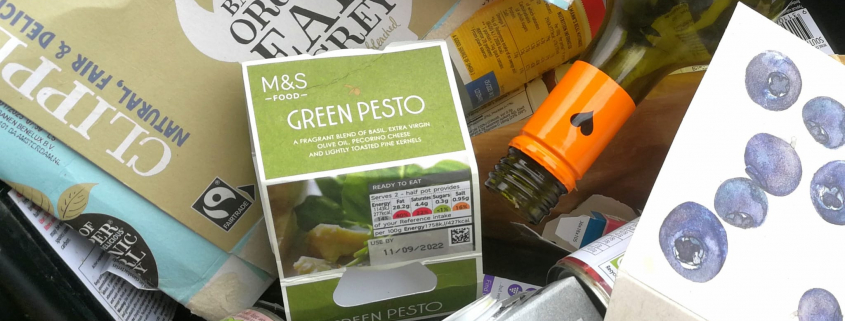Do you consider what happens to your waste? (First published in West Sussex County Times)
 In West Sussex, 58.8% of an average household waste bin’s contents could have been diverted from general rubbish. Shockingly, 12.9% of the contents are items that could have been placed in kerbside recycling, and 40.5% is food waste. West Sussex County Council (WSCC) are asking us to reduce what we use, and re-use where possible. If items can’t be re-used, then recycle or compost. But what happens to the rest of our waste?
In West Sussex, 58.8% of an average household waste bin’s contents could have been diverted from general rubbish. Shockingly, 12.9% of the contents are items that could have been placed in kerbside recycling, and 40.5% is food waste. West Sussex County Council (WSCC) are asking us to reduce what we use, and re-use where possible. If items can’t be re-used, then recycle or compost. But what happens to the rest of our waste?
As managing our environmental impact becomes increasingly important, this is a question on many peoples’ minds. In West Sussex, all household waste is processed at two sites managed by Biffa, West Sussex Ltd. A team of our recycling volunteers recently organised visits to Brookhurst Mechanical Biological Treatment Facility and Ford Materials Recycling Facility to find out more.
General waste is taken to Brookhurst Mechanical Biological Treatment Facility. Here, any recyclable materials such as metals, are extracted before the remaining material is shredded. Paper and plastic are used as refuse-derived fuel, while organic materials undergo a process of anaerobic digestion. An enclosed system accelerates the natural breakdown of biodegradable waste to produce biogas (a methane-rich fuel gas) and digestate (a compost-like output). As West Sussex has run out of landfill space, the remaining waste goes to landfill in Redhill (less than 9% in 2021). Mechanical Biological Treatment reduces the amount that goes to landfill, turning waste into a resource.

Recycling Wombles visit WSCC Biffa Ford facility
The items in your household kerbside recycling bin, including plastic pots, tubes and bottles (as of 01.09.22 plastic tops and trigger sprays can be recycled if the air is squashed out and they are put back on), glass bottles and jars, paper and cardboard, cartons (plastic lids can be left on if air is squashed out), steel and aluminum cans, tins and aerosols, and foil, are transported to Ford Materials Recycling Facility. This is one of the most advanced facilities of its type in the UK. Items are loaded onto conveyor belts, sorted and separated into different material types by a variety of technologies including; gravity, magnets and optical sorters. The separated materials are baled and sent on for further processing, to create the products of tomorrow.
While these facilities help to mitigate the impact of our waste, it is important to remember that the best solution is to minimise our own waste. For example, we should all try to reduce the amount of non-recyclable general waste that may otherwise end up being sent for Energy from Waste, remember the landfill in West Sussex is full!
Top tips:
- Avoid buying items packaged with packaging where possible and use bottle and food refill services where you can. Many supermarkets accept flexible plastics for recycling.
- Reduce your food waste: freeze leftovers, plan your shopping to reduce overbuying, and start a compost bin.
- Repair and upcycle: have you heard about your nearest repair café, where volunteers mend your items? We run the Horsham Repair Café, all the West Sussex Repair Cafes can be found HERE on this page:
- Ensure you recycle all that you can. For example, did you know that most WSCC Recycling Centres (sometimes known as the tip or dump) are now able to recycle hard plastics you can’t put in your household bin? Visit our recycling pages to find out more.
The WSCC and Horsham District Council websites have lots of useful guidance:
- https://www.westsussex.gov.uk/land-waste-and-housing/waste-and-recycling/recycling-and-waste-prevention/
- https://www.horsham.gov.uk/waste-recycling-and-bins
Sussex Green Living can help you recycle materials that are not accepted in kerbside recycling bins or recycling centres, as well as providing lots of information and support on other ways to live sustainably.
Top tips for managing your kerbside recycling:
All items should be clean, dry and loose (not stacked or placed in bags or boxes).
Cartons/TetraPaks – milk, juice, soup-including compostable TetraPaks can be recycled, please squash flat and then replace the plastic lids.
Plastic lids and trigger sprays as of 1st September 2022 – lids smaller than a jam jar CAN go in your household recycling bin but they must be attached to the bottle with the air squashed out. Large hard plastic which can not go in your household bins can now be taken to the WSCC Household Waste Recycling Centres (tip or dump) and put in in the ‘hard plastics’ skip .*
Plastic milk bottle lids – with a triangle inside with numbers 2 or 4 such can be donated to various charities including Sussex Green Living, we give them to the Springboard Project in Horsham. Learn more here.
Metal lids – all metal lids are accepted, any size (including beer bottle tops and metal wine tops).
Kitchen foil and foil milk bottle lids – can be recycled if clean and dry but it needs to be scrunched up into balls with other foil or a small clean piece of foil rather than individual small pieces so it doesn’t fall through the sorting machine.
Corks – can be recycled via Majestic Wine store.
Glass – only jars and bottles, any colour, remove lids, metal lids can go into recycling bin. Do not put wine or drink glasses in your household recycling bin, it is made of a different type of glass.
Plastic pots, tubs and bottles – including the lids and trigger sprays can be put in your household recycling bin. You can put roll-on deodorants and the lid, put in the bin attached to the deodorant container.
Bioplastics – made from plant/biological material can be put in your household recycling bin or home compost.
Bottles that contained garden chemicals – cannot go into the recycling bin but can be taken to WSCC Household Waste Recycling Centres.
Plastic bottles where the lid cannot be removed – eg suntan lotion can be recycled but need to have as much of the contents squeezed out as possible.
Flexible plastic tubes, caps, pumps, trigger sprays, roll-on deodorant, small plastic make-up tubes and lids, smaller than a jam jar size can be recycled by Sussex Green living, learn more HERE
Metal tubes – eg tomato puree and garlic can’t be recycled via bluetop bin and need to go in general waste.
Paper and card– you can leave staples and windows (eg windows on envelopes and paper bread bags) but please remove Sellotape. Paperback books can be put in the household recycling bin. Metallic paper or highly glittered is not accepted. Please remove card decorations such as bows.
Padded envelopes ( jiffy bags) – are not accepted.
Shredded paper – not accepted but can go to WSCC Household Recycling Centres. Old photos cannot be put in recycling bin.
Metal cans and aerosols – should go into recycling bin, please remove plastic lids and tops if possible, if the plastic lids are bigger than a jam jar lid they can be put loose in the household recycling bin.
Recyclables that cannot go into kerbside recycling are often accepted at WSCC Household Recycling Centres. A new scheme is operating at all the WSCC recycling centres apart from Midhurst for Hard Plastics. WSCC have an A-Z guide on their website that confirms what you can recycle in kerbside bins or at WSCC Household Recycling Centres. For all other items see link below:
By Cathy Briggs




